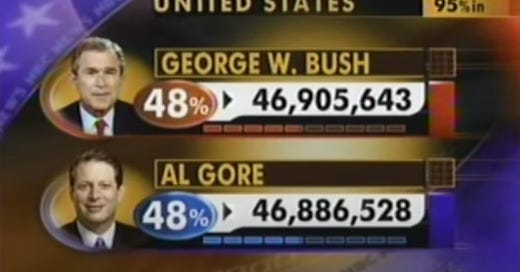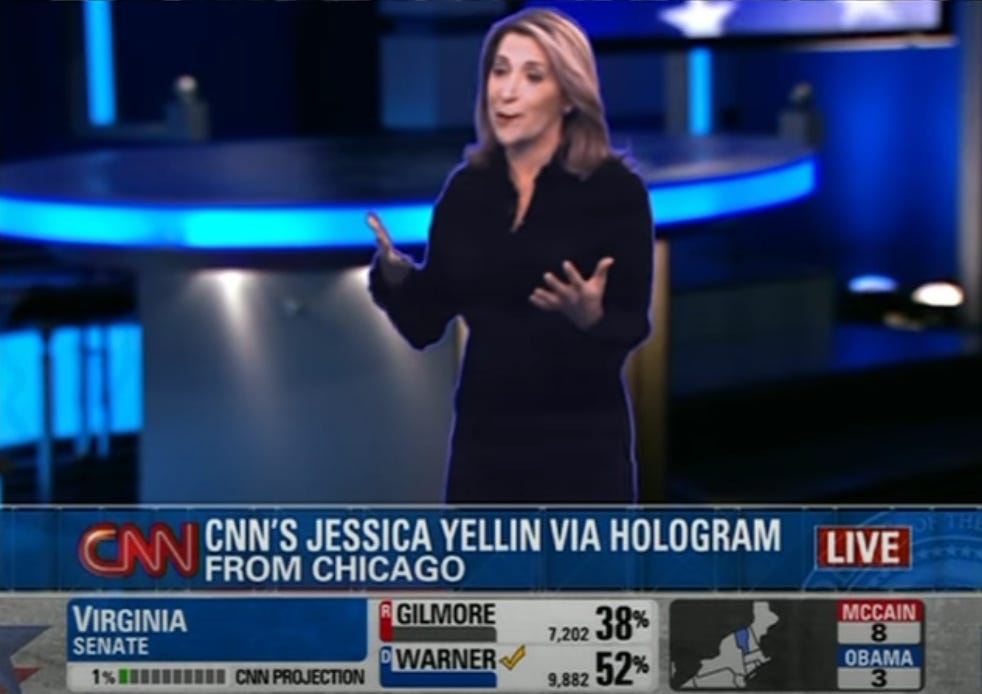A walk through Election Nights' past
How "the media" has become as much the story as the candidates.
Once upon a time, Election Night was about the election; its candidates and how citizen’s votes helped push their chosen candidates’ vision for the nation.
But then 2000 happened and the election turned into a media story.
Twenty years ago tonight I went to an Election Night party in Trenton, New Jersey, a recent college graduate full of optimism and stupidity. In 2000, what 22-year-old wasn’t overflowing with optimism and stupidity? But as the night grew long, the optimism turned to confusion. (The stupidity remained; sadly, it never left me.)
For a flashback, here’s how a couple networks covered Election Night 2000:
NBC News (I); NBC News (II); NBC News (III) (15 hours of coverage)
For a truncated version of Election Night 2000, here’s the night in five minutes where you can see how poorly the TV networks covered the election. It also turned “the media” into a story.
And in print, here’s how the New York Times described media coverage of Election Night 2000:
Having misread a contest that took stunningly unpredicted turns, some network officials conceded yesterday they had committed critical blunders Tuesday night and early yesterday, errors that compelled a presidential candidate to mistakenly concede the election and prompted some networks to re-examine how they predict winners.
The network executives, acknowledging that they had been off base twice in declaring a victor in Florida, said they were examining how the errors could have occurred. The mistakes were characterized by many in academia, politics and the news media as perhaps the most egregious election-night gaffes in the modern television era.
Of course, we wouldn’t know the winner for another few weeks, after five justices of the Supreme Court decided the fate of not just 300 million Americans, but everyone around the globe that was impacted by a Bush administration. (Hard to play counterfactual, of course, but, for example, does President Gore invade Iraq after 9/11?) It was the beginning of a new era, where two trusted institutions, the Supreme Court and the media, began to show cracks in their facade.
Twelve years ago tonight I went to an Election Party in Park Slope, Brooklyn, a recent unemployed 30-year-old who got laid off because of the financial crisis, but swept up in hope and change. In 2008, a little bit of that 2000 optimism poked through.
And when the networks called the election for President Obama, the city rang like the Yankees just won the World Series. Walking back from my friend’s apartment, cars were honking, people clapping, and the echoes of Jerry Garcia rang in my head: Strangers stopping strangers just to shake their hand.
Here’s CNN’s coverage of 2008. An easier race to call, but also notice how the production value has exponentially grown in just eight years. Graphics! Touch screens! Holograms! Election coverage is a big production, necessitating lots of planning and money to create a TV spectacular.
Elections are big business for media companies. In 2008, for example, candidates and political parties spent $2.6 billion in ads. Eight years later, and six years after Citizens United, that number ballooned to $9.8 billion. This year will be closer to $11 billion.
Four years ago tonight, as a 38-year-old, as I put my then two-year-old daughter to bed, I once again turned optimistic, and told her, “When you wake up in the morning, we will have our first woman president.” That didn’t work out. And for the second time in 16 years, the networks’ coverage left a lot to be desired.
The New York Times, the day after:
“Nobody predicted this,” said Chris Matthews on MSNBC.
“I don’t know one poll that suggested that Donald Trump was going to have this kind of night,” said Jake Tapper on CNN.
“He is still in this,” said Chris Wallace of Fox News a few minutes after 9 p.m., adding, “and I’m not sure a lot of us thought he would be at this hour.”
As Americans watched the presidential race turn on Tuesday from what had been predicted to be a Hillary Clinton victory into a late-night nail-biter, television news anchors seemed as stunned as viewers at home.
“I was wrong: This is a tight race,” said Nicolle Wallace, a Republican strategist and MSNBC analyst. On ABC News, the correspondent Terry Moran spoke of Britain’s vote to exit the European Union and said, “I’ve got a bad sense of déjà vu.” John King, CNN’s slicer and dicer of voting returns, declared, “We’re having a conversation now that was impossible to have two weeks ago.”
By 10 p.m., even as the outcome remained unclear, there were early hints of self-recrimination for the months of political analysis that now, against all expectations, appeared to be falling short.
Once again, the media was the story. And since you’ve all been around over the last four years, you know what’s happened since. Critics continue to warn the press not screw tonight up, with folks like Eric Boehlert pleading to network execs to not put Trump on the air:
After four years of falling victim to Trump intimidation, the news media have a defining opportunity this week to do the right thing and to reject Republican bullying. It ought to be a simple choice. But nothing over the last four years has proven easy for the press.
Columbia Journalism Review has a good piece today about how networks and news organizations are going to try to move slowly tonight
This year, on-air staff intend to explain developments extra carefully—including possible red or blue “mirages” in states that count early ballots (which are generally expected to favor Democrats) and day-of votes (which may be better for Republicans) at different times—and will report ongoing vote counts with reference to total expected votes cast, and not the typical measure of in-person precincts reported. Executives at the Associated Press, a respected caller of election results, plan to show their work, explaining—in interviews, if necessary—why they have and haven’t made certain calls. (Going public in such a way, the AP’s David Bauder writes, conflicts with the AP’s typical “company culture.”) And the Times won’t have an election-night “needle” projecting a national winner—as it did, nightmarishly, in 2016—because mass mail-in voting makes the state of play harder to calibrate. Instead, the paper will have individual needles for three states—Florida, Georgia, and North Carolina—that offer detailed data and are expected to count quickly.
And of course, it’s not just the networks, but the social media universe that has to be cautious and patient. The platforms have put in guardrails to blunt the spread of disinformation. Axios takes a look at what they’re doing:
The big picture: Tech companies have been more forthcoming about how they plan to handle posts from Trump or others declaring premature victories.
Twitter will rely on calls from ABC News, AP, CNN, CBS News, Decision Desk HQ, Fox News and NBC News to determine winners. It will label tweets from anyone, including Trump, that call an election without citing one of these outlets before Twitter is able to make a final call.
Facebook will rely on consensus results from the National Election Pool/Edison via Reuters, the AP, NBC, ABC, CBS and Fox. It will label posts that prematurely call victory.
Snapchat says it will take down any premature election calls that haven't been verified, as well as any election-related misinformation, instead of just minimizing its distribution.
YouTube announced that it will add an information panel noting that "election results may not be final" to all election-related search results and videos about the election. It will link to Google’s election counts.
This year, it’s obviously a different environment for an election. As the AP writes:
There’s a good chance Americans won’t know the winner of Tuesday’s presidential election when they go to bed that night.
The main reason? Many states have made it easier to request a mail ballot amid the coronavirus pandemic and concerns about crowded polling places. But mail ballots generally require more time to process than ballots that are cast in person.
With that, I’ll leave you with my former colleague Scott Nover’s newsletter from this morning, which sums today up as succinctly as one can: “Vote. That’s all.”
Thank you for allowing me in your inbox, today and every day. If you have tips, thoughts on the newsletter, or would like to vote for me for president, send me an email. Or you can follow me on Twitter. If you appreciated this edition, please consider sharing across your social networks and get your colleagues to sign up. Thanks for reading! Vote!!
Ray Charles, “America the Beautiful”
Some interesting links:
For political ad blackouts:
Verizon Media Plans Political Ad Blackout After Election (WSJ)
YouTube will end full-day ‘masthead’ reservations like Trump bought for Election Day (CNBC)
For understanding tonight a bit better:
In a Hot Election, the Cool-Headed Associated Press Takes Center Stage (NYT)
Here are news networks’ election night coverage plans (Adweek)
How is TV news going to cover the weirdest, most fraught election in history? All of your questions answered. (Washington Post)
Networks Pledge Caution for an Election Night Like No Other (NYT)
Election Night Preview: How The Networks Plan To Cover The Finale To A Campaign Of Chaos And Confusion (Deadline)
For how Congress failed over the last four years:
Congress has failed to pass Big Tech legislation in 4 years leading up to the next election (CNBC)
For how Quibi failed:
Quibi Was Supposed to Revolutionize Hollywood. Here’s Why It Failed. (WSJ)
For platforms:
Five days of Facebook fact-checking (CJR)





